- Clone
- Ba13 (See other available formats)
- Regulatory Status
- RUO
- Other Names
- CD200 R3, CD200RLb, OX-2 Receptor 3, CD200 receptor 3
- Isotype
- Rat IgG2a, κ
- Ave. Rating
- Submit a Review
- Product Citations
- publications
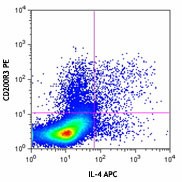
-

C57BL/6 bone marrow cell-derived basophils were stimulated with Ultra-LEAF™ purified CD200R3 (clone Ba13) (top), or rat IgG2a, κ isotype control (bottom) for 6 hours in presence of Brefeldin A. The cells were then surface stained with CD200R3 (clone Ba160) PE (top), followed by intracellular staining with IL-4 APC. -

| Cat # | Size | Price | Quantity Check Availability | Save | ||
|---|---|---|---|---|---|---|
| 142215 | 100 µg | 216€ | ||||
| 142216 | 1 mg | 595€ | ||||
CD200R3, also known as CD200RLb and OX-2 Receptor 3, is a disulfide-linked dimeric CD200R-like receptor which belongs to immunoglobulin superfamily. Its positively charged amino acid lysine associates with ITAM- or YxxM motif-bearing adaptor molecules such as DAP12, DAP10, FcRγ, and CD3ζ. CD200R3 functions as an activating receptor to regulate IgE independent immune response.
Product DetailsProduct Details
- Verified Reactivity
- Mouse
- Antibody Type
- Monoclonal
- Host Species
- Rat
- Immunogen
- Mouse primary basophils
- Formulation
- 0.2 µm filtered in phosphate-buffered solution, pH 7.2, containing no preservative.
- Endotoxin Level
- Less than 0.01 EU/µg of the protein (< 0.001 ng/µg of the protein) as determined by the LAL test.
- Preparation
- The Ultra-LEAF™ (Low Endotoxin, Azide-Free) antibody was purified by affinity chromatography.
- Concentration
- The antibody is bottled at the concentration indicated on the vial, typically between 2 mg/mL and 3 mg/mL. Older lots may have also been bottled at 1 mg/mL. To obtain lot-specific concentration and expiration, please enter the lot number in our Certificate of Analysis online tool.
- Storage & Handling
- The antibody solution should be stored undiluted between 2°C and 8°C. This Ultra-LEAF™ solution contains no preservative; handle under aseptic conditions.
- Application
-
FC - Quality tested
Activ - Reported in the literature - Recommended Usage
-
Each lot of this antibody is quality control tested by immunofluorescent staining with flow cytometric analysis. For flow cytometric staining, the suggested use of this reagent is ≤ 1.0 µg per million cells in 100 µL volume. It is recommended that the reagent be titrated for optimal performance for each application.
- Application Notes
-
Ba13 recognizes circulating and bone marrow basophils; it also recognizes a subset of mast cells in the peritoneal cavity and skin. Additional reported applications (for the relevant formats) include: stimulation of bone marrow derived basophils to produce IL-4.
- RRID
-
AB_2888753 (BioLegend Cat. No. 142215)
AB_2888753 (BioLegend Cat. No. 142216)
Antigen Details
- Structure
- Immunoglobulin superfamily; disulfide-linked dimer with positively charge amino acids in transmembrane; molecular weight is about ~38 kD or ~74 kD (reduced or non-reduced conditions, respectively)
- Distribution
-
Basophils in peripheral blood, bone marrow, spleen; mast cells in peritoneal cavity and skin
- Function
- Transduce stimulatory signals
- Interaction
- DAP12, DAP10, FcRγ, or CD3ζ
- Cell Type
- Basophils, Mast cells
- Biology Area
- Immunology, Inhibitory Molecules
- Molecular Family
- CD Molecules
- Antigen References
-
1. Voehringer D, et al. 2004. J. Biol. Chem. 52:54117.
2. Kojima T, et al. 2007. J. Immunol. 179:7093.
3. Sato K, et al. 2009. Blood 113:4780. - Gene ID
- 74603 View all products for this Gene ID
- UniProt
- View information about CD200R3 on UniProt.org
Related Pages & Pathways
Pages
Related FAQs
- Do you guarantee that your antibodies are totally pathogen free?
-
BioLegend does not test for pathogens in-house aside from the GoInVivo™ product line. However, upon request, this can be tested on a custom basis with an outside, independent laboratory.
- Does BioLegend test each Ultra-LEAF™ antibody by functional assay?
-
No, BioLegend does not test Ultra-LEAF™ antibodies by functional assays unless otherwise indicated. Due to the possible complexities and variations of uses of biofunctional antibodies in different assays and because of the large product portfolio, BioLegend does not currently perform functional assays as a routine QC for the antibodies. However, we do provide references in which the antibodies were used for functional assays and we do perform QC to verify the specificity and quality of the antibody based on our strict specification criteria.
- Does BioLegend test each Ultra-LEAF™ antibody for potential pathogens?
-
No, BioLegend does not test for pathogens in-house unless otherwise indicated. However, we can recommend an outside vendor to perform this testing as needed.
- Have you tested this Ultra-LEAF™ antibody for in vivo or in vitro applications?
-
We don't test our antibodies for in vivo or in vitro applications unless otherwise indicated. Depending on the product, the TDS may describe literature supporting usage of a particular product for bioassay. It may be best to further consult the literature to find clone specific information.
Other Formats
View All CD200R3 Reagents Request Custom Conjugation| Description | Clone | Applications |
|---|---|---|
| Purified anti-mouse CD200R3 | Ba13 | FC |
| PE anti-mouse CD200R3 | Ba13 | FC |
| APC anti-mouse CD200R3 | Ba13 | FC |
| TotalSeq™-A0809 anti-mouse CD200R3 | Ba13 | PG |
| PerCP/Cyanine5.5 anti-mouse CD200R3 | Ba13 | FC |
| PE/Cyanine7 anti-mouse CD200R3 | Ba13 | FC |
| Ultra-LEAF™ Purified anti-mouse CD200R3 | Ba13 | FC,Activ |
Compare Data Across All Formats
This data display is provided for general comparisons between formats.
Your actual data may vary due to variations in samples, target cells, instruments and their settings, staining conditions, and other factors.
If you need assistance with selecting the best format contact our expert technical support team.
-
Purified anti-mouse CD200R3
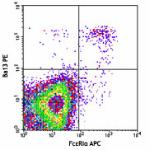
C57BL/6 peripheral blood leukocytes were stained with FcεRIα... 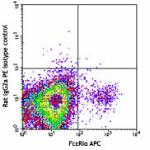
-
PE anti-mouse CD200R3

C57BL/6 peripheral blood leukocytes were stained with Fc&eps... 
-
APC anti-mouse CD200R3
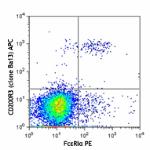
C57BL/6 mouse peripheral blood leukocytes were stained with ... 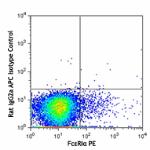
-
TotalSeq™-A0809 anti-mouse CD200R3
-
PerCP/Cyanine5.5 anti-mouse CD200R3

BALB/c mouse peripheral blood leukocytes were stained with F... -
PE/Cyanine7 anti-mouse CD200R3

BALB/c mouse peripheral blood leukocytes were stained with F... -
Ultra-LEAF™ Purified anti-mouse CD200R3
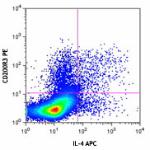
C57BL/6 bone marrow cell-derived basophils were stimulated w... 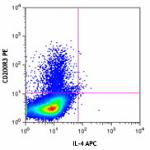

 Login / Register
Login / Register 









Follow Us